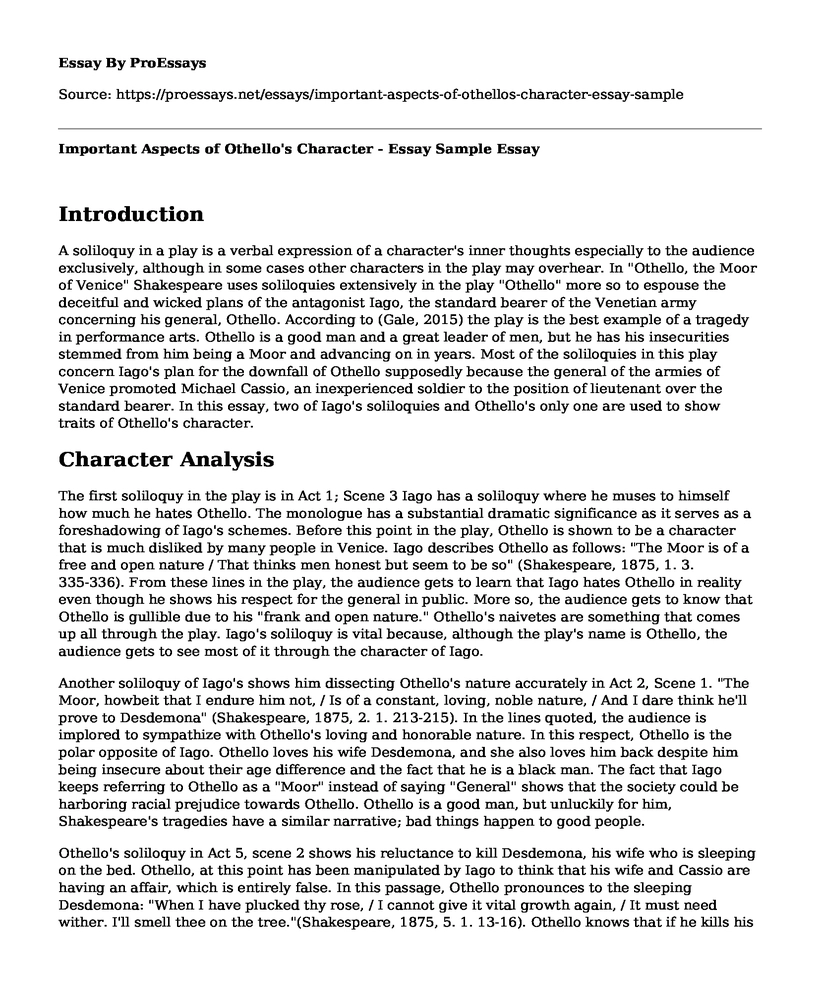Introduction
A soliloquy in a play is a verbal expression of a character's inner thoughts especially to the audience exclusively, although in some cases other characters in the play may overhear. In "Othello, the Moor of Venice" Shakespeare uses soliloquies extensively in the play "Othello" more so to espouse the deceitful and wicked plans of the antagonist Iago, the standard bearer of the Venetian army concerning his general, Othello. According to (Gale, 2015) the play is the best example of a tragedy in performance arts. Othello is a good man and a great leader of men, but he has his insecurities stemmed from him being a Moor and advancing on in years. Most of the soliloquies in this play concern Iago's plan for the downfall of Othello supposedly because the general of the armies of Venice promoted Michael Cassio, an inexperienced soldier to the position of lieutenant over the standard bearer. In this essay, two of Iago's soliloquies and Othello's only one are used to show traits of Othello's character.
Character Analysis
The first soliloquy in the play is in Act 1; Scene 3 Iago has a soliloquy where he muses to himself how much he hates Othello. The monologue has a substantial dramatic significance as it serves as a foreshadowing of Iago's schemes. Before this point in the play, Othello is shown to be a character that is much disliked by many people in Venice. Iago describes Othello as follows: "The Moor is of a free and open nature / That thinks men honest but seem to be so" (Shakespeare, 1875, 1. 3. 335-336). From these lines in the play, the audience gets to learn that Iago hates Othello in reality even though he shows his respect for the general in public. More so, the audience gets to know that Othello is gullible due to his "frank and open nature." Othello's naivetes are something that comes up all through the play. Iago's soliloquy is vital because, although the play's name is Othello, the audience gets to see most of it through the character of Iago.
Another soliloquy of Iago's shows him dissecting Othello's nature accurately in Act 2, Scene 1. "The Moor, howbeit that I endure him not, / Is of a constant, loving, noble nature, / And I dare think he'll prove to Desdemona" (Shakespeare, 1875, 2. 1. 213-215). In the lines quoted, the audience is implored to sympathize with Othello's loving and honorable nature. In this respect, Othello is the polar opposite of Iago. Othello loves his wife Desdemona, and she also loves him back despite him being insecure about their age difference and the fact that he is a black man. The fact that Iago keeps referring to Othello as a "Moor" instead of saying "General" shows that the society could be harboring racial prejudice towards Othello. Othello is a good man, but unluckily for him, Shakespeare's tragedies have a similar narrative; bad things happen to good people.
Othello's soliloquy in Act 5, scene 2 shows his reluctance to kill Desdemona, his wife who is sleeping on the bed. Othello, at this point has been manipulated by Iago to think that his wife and Cassio are having an affair, which is entirely false. In this passage, Othello pronounces to the sleeping Desdemona: "When I have plucked thy rose, / I cannot give it vital growth again, / It must need wither. I'll smell thee on the tree."(Shakespeare, 1875, 5. 1. 13-16). Othello knows that if he kills his wife Desdemona he too will be put to death because her father Brabantio is an influential senator in Venice. Othello is emotionally imbalanced, his love for Desdemona turned to jealousy and logic has left him at this point in the play. While being, an astute military man, Othello is shown to be mentally and psychologically weak.
Conclusion
In conclusion, Othello's character is brought out well by the soliloquies in the play. Othello suffers the tragedy of losing his wife when he kills her, and then he commits suicide when he is about to be arrested for his crimes. Iago succeeds in totally ruining Othello's life. However, the reader is left wondering if he will regret his actions. Most likely, he will pay the ultimate price for his actions. In Shakespeare's tragedies, good people such as Othello usually suffer the worst fate in the end- that is death.
References
Gale, C. L. (2015). A Study Guide for William Shakespeare's Othello. Gale, Cengage Learning
Shakespeare, W., Singer, S. W., & Lloyd, W. W. (1875). Othello, the Moor of Venice (Vol. 10). G. Bell. Retrieved From https://books.google.co.ke/Othello, The Moor of Venice.
Cite this page
Important Aspects of Othello's Character - Essay Sample. (2022, Jul 21). Retrieved from https://proessays.net/essays/important-aspects-of-othellos-character-essay-sample
If you are the original author of this essay and no longer wish to have it published on the ProEssays website, please click below to request its removal:
- Critical Essay Example of The Catbird Seat Story
- Literary Essay Example: Theme of Death in The Raven and Frankenstein
- Hamlet's Hamartia Essay
- Annotated Bibliography Example on The Hunger Games
- Literary Analysis Essay on Pride and Prejudice: Does Mr and Mrs Bennet Good Parents?
- Fate in The Iliad: Women & War Prizes - Essay Sample
- Essay Example on Hamlet and Oedipus: Literary Classics Relevant Today







